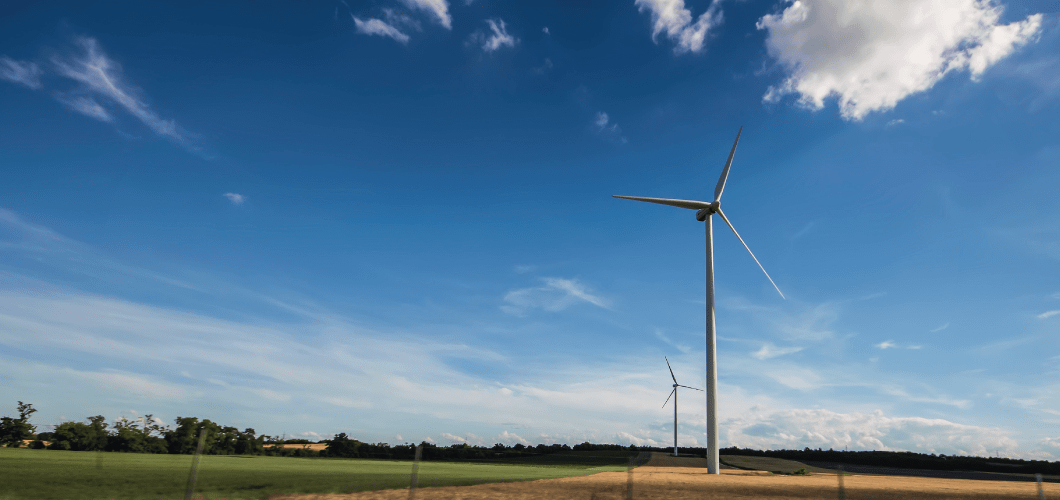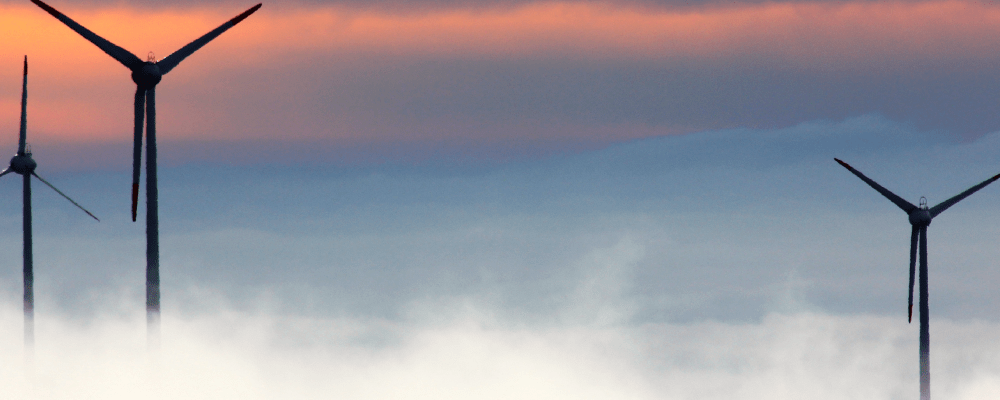Climate change is no longer just a scientific concept; greenhouse gas levels are higher than they have been in the last 650,000 years. Our planet’s fossil fuel consumption has increased carbon dioxide levels in the atmosphere by more than a third since the industrial revolution and changes to our planet that have historically taken thousands of years are now happening over the course of decades. Scientists warn that on our current trajectory, 2050 will see up to 350 million people facing frequent freak weather incidents – flooding, tropical storms, deadly heatwaves – and that 2100 will see a sea level up to 77cm higher.
With both animal and human populations at risk, more government carbon quotas and targets are being put in place and more funding is being directed toward the development of alternative energy sources. From wind and solar to crop-based biofuels, the Energy sector is taking action and the move towards renewables is well underway.
Wind Power

In January this year, the UK set a new national record for wind power production: output topped 10 gigawatts for the first time. Possessing some of the windiest regions in Europe, Britain is leading a colossal move to wind power. In fact, in the last three months of 2018 alone, wind farms provided more electricity than Britain’s nuclear power stations for the first time. Between January and March, wind power produced 18.8% of the UK’s energy needs, compared to nuclear’s 18.76%. On one night alone, wind accounted for almost half (47%) of Britain’s electricity. Offshore wind is estimated to be worth up to £8 billion annually by 2050, especially as more infrastructure is opened and the cost of technologies becomes cheaper.
Elsewhere in Europe, electric utility company Engie have announced plans to develop 300 megawatts of wind energy across 9 wind farms in Spain, independent of any government funding. In Germany, the federal grid regulator accepted four bids for a total of 1,490 MW of offshore wind capacity in the North Sea. In March, Swedish power company Vattenfall announced that it won its bid to build a 700 MW offshore wind farm in the Netherlands, which would make it the first nonsubsidized wind energy project there.
In South America there is also a push for wind development; Iberdrola has been awarded 295 megawatts of wind power capacity in Brazil. Neoenergia will build 9 wind farms in the Santa Luzia area in the state of Paraíba which will become operational in January 2022, taking Neoenergia's wind power capacity to over 800 MW.
Solar Power

Similar to wind, there are now at least a dozen unsubsidized solar projects that have broken ground in Europe. Arguably more impressive however, is the action being taken by the US’s corporate giants.
Walmart for one have installed on-site solar panels on the roofs and parking lots of over 350 stores. Apple have arranged to pay $848 million over 25 years for most of the electricity from a large solar farm in California, while selling the excess back to the grid. Dozens of Fortune 500 companies, from tech giants like Google to General Motors, are voluntarily investing billions of dollars in new wind and solar projects to power their operations or offset their conventional energy use. In fact, at least 22 companies in the Fortune 500 have committed to buying enough renewable power to match 100% of their electricity use in the years ahead.
In Australia, Mars have pledged to go carbon neutral with a new green power plant being built to supply all of the confectionary maker's electricity by 2020. In fact, almost half of Australian big businesses are moving to renewables, the number of firms generating solar power having doubled in less than 2 years. As the average household and small-business energy bill is more than 80% higher than a decade ago and gas prices have increased (threefold in five years), almost half of Australia’s large businesses – specifically 46% – are actively transitioning to cheaper renewable energy as power bills threaten their bottom line. Many are even going off the grid by building their own generators and battery storage.
Australia’s organisations echo a wider global businesses transition to renewables as an investment opportunity with 131 of the world’s largest companies on their way to being powered by 100% renewables.
Electric Cars and Biofuels

As our Transportation consultant Mark Beattie reported in his last blog, Is The Automotive Industry Geared For Change?, the automotive industry is making headway in the race for renewables. 2017 saw 2 million electric cars on the road and the International Energy Agency predicts that this figure will rise to 20 million by 2020, and 70 million by 2025.
In Norway, more than half of all vehicles sold are now electric. Their 2025 goal is to get 100% zero emission vehicles on its roads and to completely ban the sales of new fossil fuel based cars. 2017 marked the first time in the country’s history (since the introduction of electric vehicles) that the demand for petroleum products decreased.
As more electric vehicles are bought and used, the cheaper their manufacture and maintenance becomes. Governments around the world have implemented policies supporting a transition to electric vehicles, including Canada, China, France, Japan, the Netherlands, and Sweden. France and the UK have pledged to ban the sales of new fossil fuel-based cars by 2040 and the mayors of Paris, Madrid and Mexico City have all said they will ban diesel vehicles in their city centres by 2025.
Costa Rica is also proving a front runner, already generating more than 99% of its electricity from renewable sources and pledging to ban fossil fuels completely to become world's first decarbonised society. Last month, the Central American country said they would begin to implement a plan to end fossil fuel use in transport by 2021 – the 200th year of Costa Rican independence.
As well as electric power, biofuels are being investigated to lessen our dependence on fossil fuels. Policies such as the Renewable Energy Directive (RED) and the Fuel Quality Directive of the European Union have led to a significant increase in demand for biofuel over the past decade. Ambitious mandates set by various countries – the US, China and Brazil for example – to blend biofuels with conventional fuels has further boosted the demand for biofuels across the world too.
In other research, bacteria has proven capable of producing biofuels. A team of engineers recently discovered that a naturally occurring bacterium in mushrooms can convert plant-based material cellulose into biobutanol. In this method, the production is far cheaper and by using less land, does not compete with other food production.
Tidal Power

In comparison to its peers, tidal energy has been slow to develop into a reliable form of grid power; corrosion, biofouling and extreme wave/current forces all cause the destruction of devices. Yet, in spite of this, recent projects suggest that this might be changing.
Atlantis Resources, a UK–based tidal energy developer, recently announced that its MeyGen project delivered 6 GWh to the grid in the past year. It produced 1,400 MWh in March alone, equivalent to the monthly energy consumption of about 1,500 US homes. What’s more, Scotrenewables, another UK tidal developer, reported that its device generated a cumulative 2 GWh between April and August 2017.
Tidal energy still has a way to go before it becomes cost-competitive with other renewable energy technologies, but these numbers point to a maturing sector that is now reliably generating real power for the grid. Tidal energy is dense so in theory, a tidal energy converter has a smaller physical footprint than a solar or wind array but can produce the same amount of power. On top of that, tides are predictable and easy to forecast, not just hours in advance but decades, making tidal energy much easier to integrate. If the technology continues to mature, tidal energy could become a significant renewable power source in many countries.
Conclusion
The last few years have brought with them monumental progress in the Renewables sector, holding major promise for the industry’s future. The move is one that encompasses every industry, even the decentralized platform technology Blockchain. Privately held Conjule, for example, uses a blockchain platform to enable the trading of excess energy generated by homeowners' solar panels. With so many corporations and governments on side, the move is being embraced worldwide.
With the industry booming, there also is a renewed demand for quality talent. As renewable energy companies undergo crucial expansion, the need for experienced, strategic leaders has never been higher.
CSG have a dedicated team within Energy & Natural Resources working specifically in the Renewables market. We have a proven track record when it comes to placing high-level senior professionals in business-critical roles, and a thorough understanding of the market to go with it. Currently working across the US and Europe with a number of emerging solar and wind companies, we also place roles – Directors of Sales, Heads of O&M Services, Global Supply Chain Managers – as far as Dubai and the APAC region.
If you would benefit from our services, or would like any advice on your next career move, I can be reached at michael.isle@csgtalent.com or +44 (0) 113 259 6628.
References
Independent, Sea levels 'could be rising a centimetre a year' by 2100, say scientists, 12.02.18
Independent, UK sets new national record for wind power production, say scientists, 17.01.18
Energy Live News, US fossil fuel use in power sector at 23-year low, 31.05.18
Inside Climate News, Climate Change Is Happening Faster Than Expected, and It’s More Extreme, 26.12.17
Forbes, Despite Trump, U.S. Progressing Toward Obama's Climate Goals, 01.06.18
Futurity, Bacteria could make cheaper biofuel without so much land, 14.05.18
Science Trends, Oil Industry May Soon Be Losing Sales From Electric Car Adoption, 31.05.18
Vox, Europe is building more wind and solar — without any subsidies, 31.05.18
The New York Times, A Year After Trump’s Paris Pullout, U.S. Companies Are Driving a Renewables Boom, 01.06.18
Axios, Engineering projects show growing promise for tidal energy, 01.06.18
The Guardian, Almost half of Australian big business moving to renewables, 14.05.18






